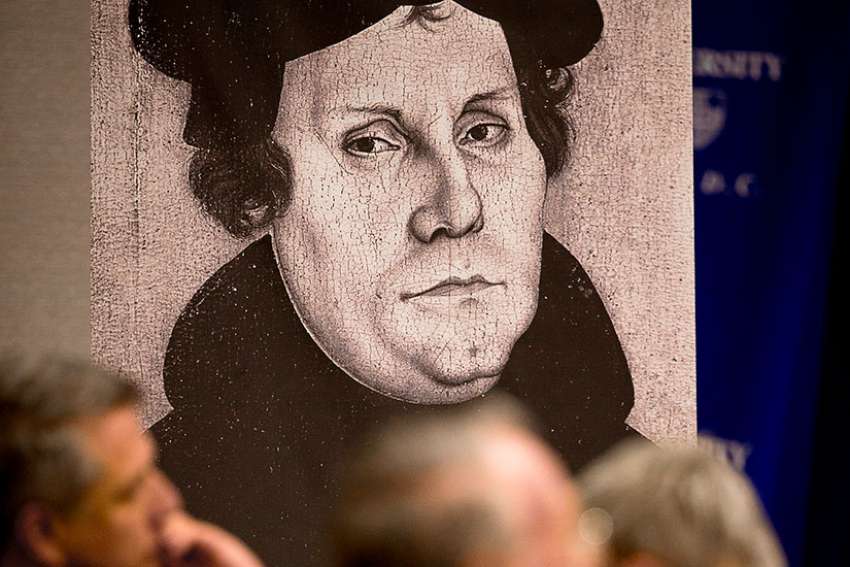In theological terms, justification is God's act of removing the guilt and penalty of sin while at the same time declaring a sinner righteous through Christ's sacrifice on the cross.
Luther absorbed the work of 15th-century philosopher Gabriel Biel but ultimately rejected it, according to the Rev. Theodor Dieter, director of the Institute for Ecumenical Research in Germany. Luther, though, accepted the ideas of an author whose name was never made known but whose work Luther himself published in 1516 and again in 1518.
Rev. Dieter made his remarks May 31 during the May 30-June 1 conference "Luther and the Shaping of the Catholic Tradition," marking the 500th anniversary of Luther posting his 95 theses. It was held at The Catholic University of America in Washington.
Luther's "Disputation Against Scholastic Theology" "has at its core a short text of Gabriel Biel," Rev. Dieter said. "Nearly two-thirds of the 95 theses of this early disputation deal directly or indirectly with this."
Biel wrote about two "turning points": One was " the transition from the state of sin to the state of grace," and the other "the transition from a life in grace on earth to eternal life," Dieter said. "Even people who have sinned to the maximal degree nevertheless have at every moment the possibility to make a new beginning, to create an act of their will that loves God above all and for God's sake. So says Biel."
However, Biel's work contained an "aporia," or an irresolvable internal contradiction, according to Rev. Dieter. "I have committed a mortal sin, but I wish to gain eternal life, thus I want something that is good for me – but in order to do so, I have to love God only for God's sake, not for my own sake. It is difficult to overcome this aporia if one is in it. Mystics took this problem very seriously when they discussed and spiritually experienced the concept of loving God in hell, that is; loving God without expecting any reward."
Rev. Dieter added, "Luther reversed Biel's dictum, 'If one does what is in his power, God will give his grace,' by saying: An act of friendship-love for God is not prior to receiving grace, rather it is the consequence of conversion, following grace in order and time."
He noted, "The basic difference that prompts Luther's further development is his different understanding of the love for God and the fulfillment of God's law. Luther does not focus his concept of the love for God on acts of the will; rather, he understands love for God as the complete dedication of the whole person to God with all aspects of her being."
The unknown author – whose work was declared by Luther that "beside the Bible and St. Augustine he had not read a book from which he had learned more about God, Christ, and the human being than this one" – held that turning away from God was "the presumption that something belongs to oneself," Rev. Dieter said. "The fall of Adam did not happen, as the author explains, because he ate an apple, but because of his presumption, claiming his 'I,' 'My,' "Me.'"
He added, "Luther's understanding of justification ... was sharply criticized by Cardinal (Thomas) Cajetan as being the equivalent of 'building a new church' in 1518." The cardinal, a prolific theologian, interviewed Luther at Augsburg, Germany, in the summer of 1518.
"But 481 years later," Rev. Dieter continued, "the Roman Catholic magisterium could say: 'Catholics can share the concern of the Reformers to ground faith in the objective reality of Christ's promise, to look away from one's own experience, and to trust in Christ's forgiving word alone.'"
The "481 years later" phrase refers to the Catholic-Lutheran Joint Declaration on the Doctrine of Justification, issued in 1999.
"We confess together that all persons depend completely on the saving grace of God for their salvation. The freedom they possess in relation to persons and the things of this world is no freedom in relation to salvation," it says in part. People, it adds, are "incapable of turning by themselves to God to seek deliverance, of meriting their justification before God, or of attaining salvation by their own abilities. Justification takes place solely by God's grace."
Insights into how Luther formed his stance on justification can be gleaned from reading his sermons – most of which did not see the light of day until about a century or so ago, according to the Rev. Timothy Wengert, who recently retired as a professor of Reformation history at Lutheran Theological Seminary in Philadelphia.
"These documents give a far more accurate reading of – to use social psychologist Erving Goffman's phrase – Luther's presentation of his self, or at least of his theology, in everyday life, that is, to the commoners and scholars of his day," Rev. Wengert said.
Luther insisted that "with God there is only and always 'gabe ohne gegengabe,' to use (contemporary German author Berndt) Hamm's apt phrase, 'gift without a reciprocal gift,'" Rev. Wengert added. "Thus, the 95 theses lack any reference to a quid pro quo in the Christian life. God empowers priest, bishop and Pope to declare the forgiveness of sin."
This, Rev. Wengert noted, ran completely counter to the prevailing notion of late-medieval Europe in which "God's grace became a kind of celestial bribe, which demanded some sort of response from the recipient. Moreover, when turned on its head, human giving then obligated God to reciprocate," he said, even if it meant that " one gave God a leaden coin to receive gold in return."


